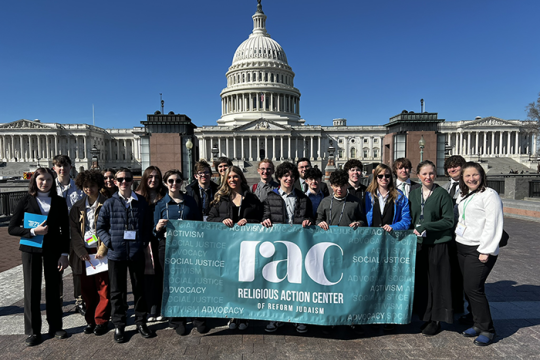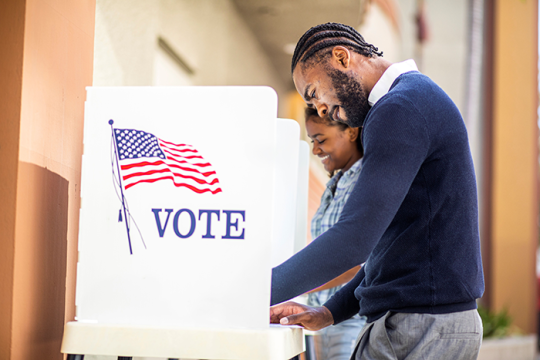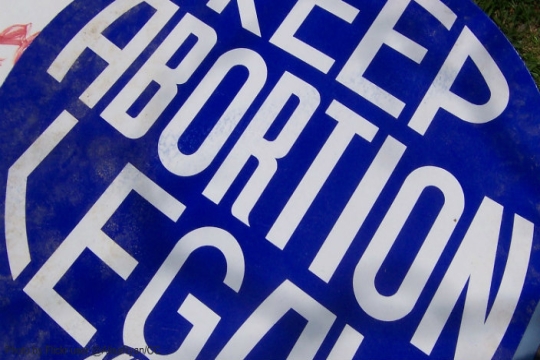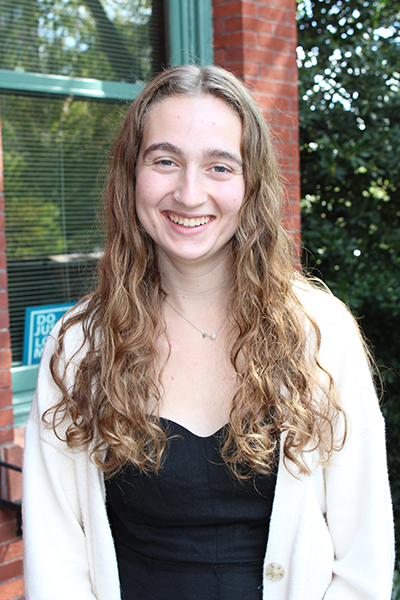
The RAC is proud to bring thousands of teens to Washington D.C. for our annual L'Taken Social Justice Seminars. After three days of intensive programming, learning about just a few of the many issues prevalent in our country today, all participants travel to Capitol Hill to meet with their members of Congress and advocate in support of the things they care about.
As we celebrate Disability Pride Month in July and the 34th anniversary of the Americans with Disabilities Act (ADA) on July 26th, we think about all the progress that's been made and the work that is left to do around disability justice in the United States. One major gap that remains is within special education, as many schools still lack federal funding to offer appropriate services. Read this blog advocating for the IDEA Full Funding Act, which would help address the problem.
Harper S. and Gail T. are highschoolers at Temple Beth Shalom in Needham, Massachusetts and Eli F. is a high schooler at Temple Israel in Boston, Massachusetts. They participated in the L'Taken Social Justice Seminar in February 2024, when they delivered this speech to their members of Congress.
(Harper) Hello, thank you so much for meeting with us today. My name is Harper Schneiderman, my pronouns are she/her, and I belong to Temple Beth Shalom in Needham, Massachusetts. My name is Eli Freedman, my pronouns are he/him, and I belong to Temple Israel in Boston, Massachusetts. My name is Gail Tromer, my pronouns are she/her, and I belong to Temple Israel in Boston, Massachusetts. We are here on behalf of the Religious Action Center of Reform Judaism and we would like to talk to you about why The Individuals with Disabilities Education Act is so important to us as a Jewish community.
(Eli) In 1975, the Education for All Handicapped Children Act was passed by congress. This later turned into the Individuals with Disabilities Education Act (IDEA), the aim of which was to ensure all children with disabilities had the federally-protected right to free, appropriate public education that is tailored to their individual needs in the least restrictive environment possible. It also states that 40% of the funding required to support students with disabilities should be provided on a federal level with the remaining 60% covered by the state.
Currently, the federal government only pays about 16% of the funding, and when you add in the fact that the number of students protected by IDEA has increased by 25% since the bill was first passed, it's easy to see why school districts are severely overburdened with the cost of providing students the services they need to succeed academically. That's what the IDEA Full Funding Act seeks to correct.
(Eli) This kind of funding is something that would have directly impacted my high school education. When I was in middle school, I attended a program for gifted students where I could learn in an environment individualized to my advanced academic needs. When I was 13, I was diagnosed with Ehlers Danlos Syndrome Type 3, a genetic disorder that took me in and out of hospitals from 9th grade on. In between specialized doctor appointments, physical therapy, and my day-to-day struggles with my disability, it was difficult to attend school. The same educational system that provided me with rigorous, appropriate academics when I was in advanced programs failed me when I required more support. Lack of individualized education disproportionately affects students with disabilities, and when my needs consistently failed to be met, I dropped out of high school at age 17. A few weeks after my 18th birthday, after months of seminars, online classes, and studying on my own, I earned my GED. During the time I should have been enjoying with friends, I was either in the hospital or teaching myself what school failed to. The IDEA Full Funding Act would help support students so they don't need to experience the same burden.
(Gail) Ensuring equal access for the disabled community is a significant Jewish value. In our Jewish religion, we believe that everyone has equal value. Rabbi Bradely Shavit Artson states: "Don't look at the flask, but see what it contains." We know that disabled students and their families often have to fight to for resources that allow them to thrive in schools. In the legend of Passover, Moses is a disabled man who was chosen by God to lead the entirety of the Israeli clan. He had his brother, Aaron, translate his dialogue to the group, but it was still Moses who led the group to their freedom and safety, something that is remarkable. When he told God he could not lead, God said to him: "Who gives people speech? Who makes them dumb or Deaf, seeing or blind? Is it not I, God?" All humans are created in the image of God, their creator. All humans are created equally and deserve the same opportunities and respect.
(Harper) The IDEA Full Funding Act 2217 was introduced in the 118th Congress by Representative Jared Huffman and Senator Chris Van Hollen. The IDEA Full Funding Act would require regular, mandatory increases in IDEA spending to finally meet our obligation to America's children and schools. We would like to thank you on behalf of the RAC for cosponsoring and supporting this act, that allows for all students to have equal opportunities to learn and succeed in school. We hope that you will continue to support this act and others like it because it is your support that will allow for members of our community to receive the education that they deserve.
(Gail) Thank you so much for taking the time to meet with us. This has been an amazing opportunity to be involved in an issue we care about, and we look forward to the senator's continued support on issues relating to disability rights.
As we celebrate Disability Pride Month, urge Congress to support the IDEA Full Funding Act.
Related Posts

Highlights from the 2024-2025 L'Taken Season

Teens Urge Congress to Protect Voting Rights


